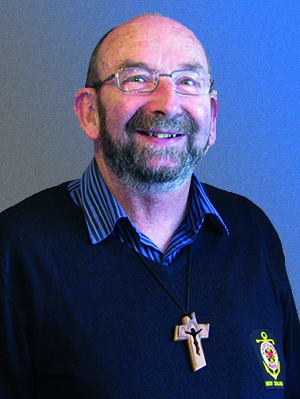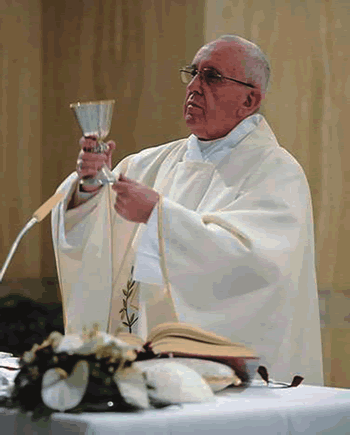‘My Lord and my God’

Fr Kevin Head sm
For the Israelites of the Old Testament, blood meant life. We can understand that easily enough -- if our blood pours out, we die. So for the Israelites, blood was more than a symbol of life, it actually meant life. And the same blood splashed on two people joined them together in the same life.
In the old covenant, when blood was placed on the altar, which symbolised God, and was then sprinkled on the people, God and God’s people were joined together in deep union. The people agreed to keep God’s commandments, and God agreed to look after them, to be one with them. That’s the old covenant: a contract, an agreement, symbolised by sacrifice.
The sacrifice of Jesus – the new covenant – unites us as closely as possible, intimately, with God. Even with all our faults, failings, foibles, idiosyncrasies and sinfulness, we become one with God. It’s awe-inspiring, bewildering, mind-boggling. And it’s one of the aspects of the celebration of the Solemnity of the Body and Blood of Christ: that in every Eucharist – the new covenant in Christ’s Blood – we are so closely united with God that God, as it were, sees no distinction between us and Christ.
We need to carry that idea into our everyday living. We are one with God in Christ through the Eucharist, and one with one another. Where there is lack of unity between us and someone else, we have to sort it out as best we can if we are to live what we celebrate at Mass.
There’s a sense in which the most important words said at Mass are ‘Go in peace …,’ not because we can then go to have a cuppa or go home, but because we are to be Christ to those we meet; to be his unity and his peace in places where there is disharmony and division. And it is in the Eucharist that we are given strength to be Christ to those we meet.
.. receiving the Lord means that we are never alone
In telling us to celebrate the Eucharist in memory of him and to receive him in Holy Communion, Our Lord is saying to us: ‘take my life into yours, into the very depths of your being; feed your minds and hearts and souls over and over again, and then you will have real life.’

Pope Francis celebrating the Eucharist, Santa Marta Chapel, 14 December 2015
In receiving him, we become one with him, and one with all his sisters and brothers, all God’s people from the beginning to the end of time … friends, brothers, sisters, parents, grandparents, all our ancestors, wives, husbands. Our sharing in the one bread and the one cup strengthens the communion which began for us in Baptism, and receiving the Lord means that we are never alone, we are a ‘single body, because we all share in this one bread’ (1 Corinthians 10:17). The third Eucharistic Prayer expresses this idea in terms of our becoming ‘one body, one spirit, in Christ.’
The Lord is truly present in the Eucharist. When I was small, I learned to say, when the host and chalice are raised after the consecration, ‘My Lord and my God,’ St Thomas’s acclamation of faith in St John’s Gospel (John 20:28). I still say those words, every time I’m at Mass. Christ is truly present: body, blood, soul and divinity – I can’t believe anything else. I can’t imagine how it would be, not to believe.
 Entries(RSS)
Entries(RSS)